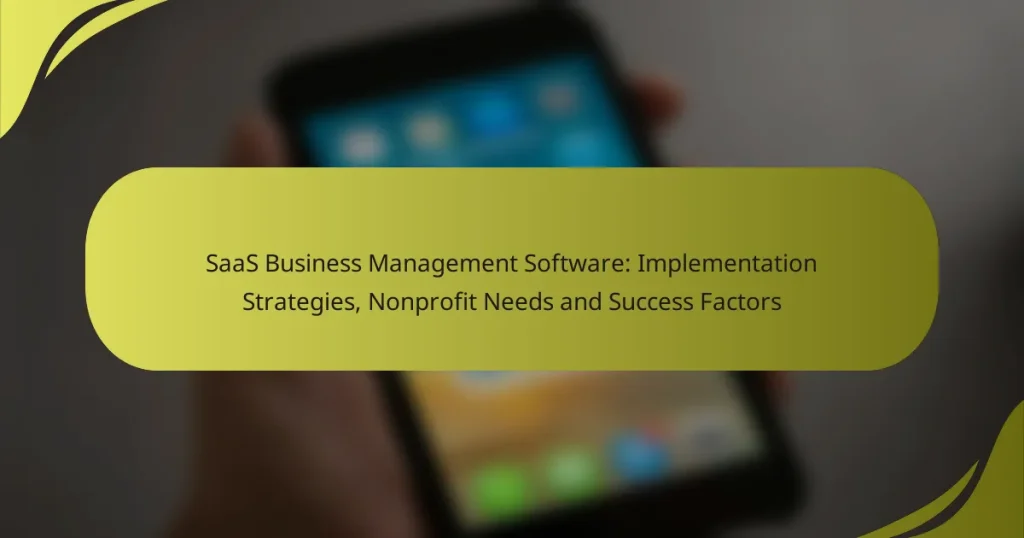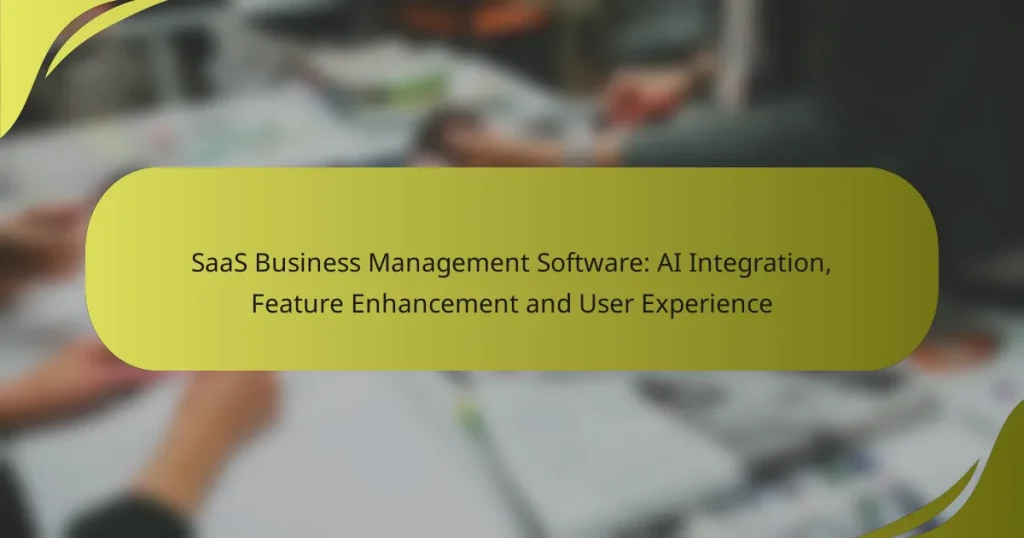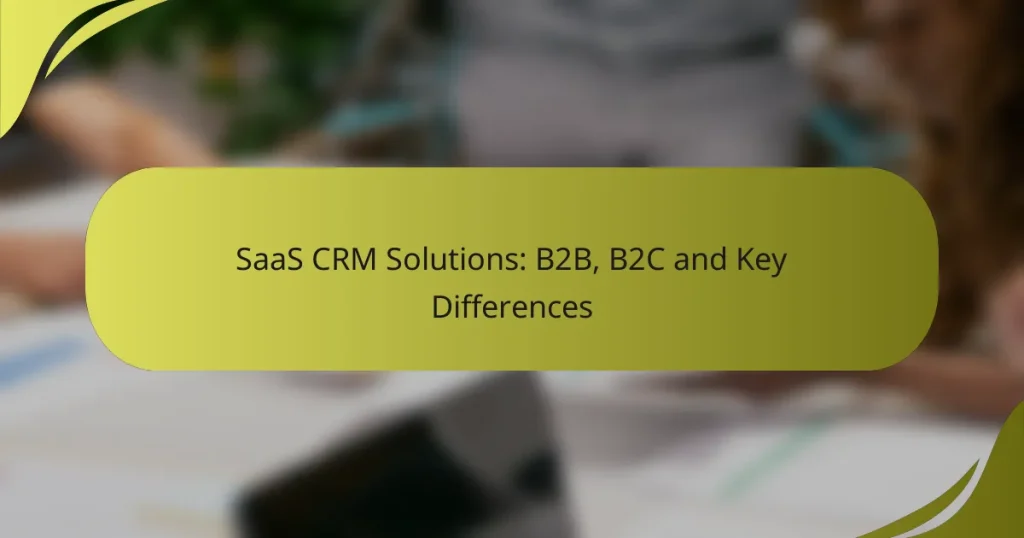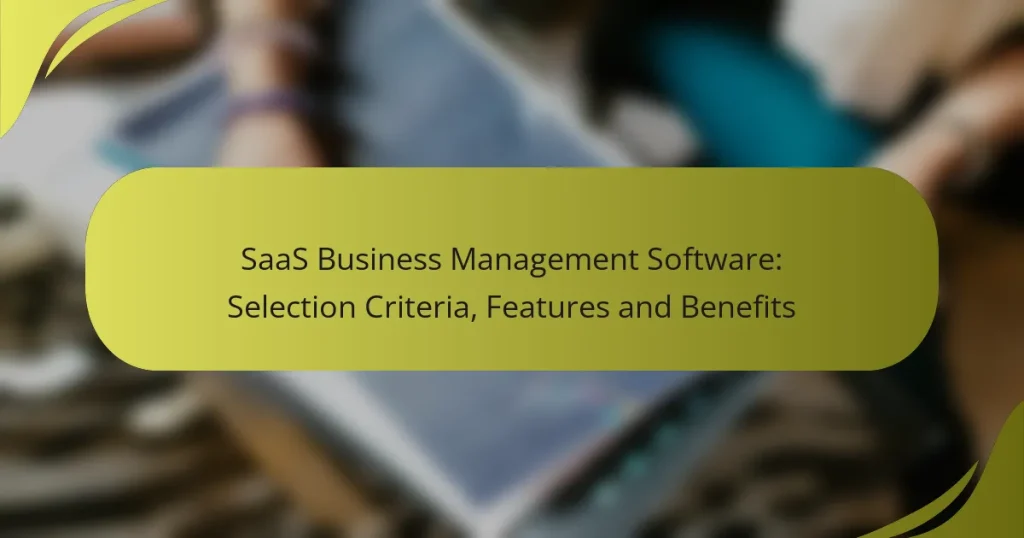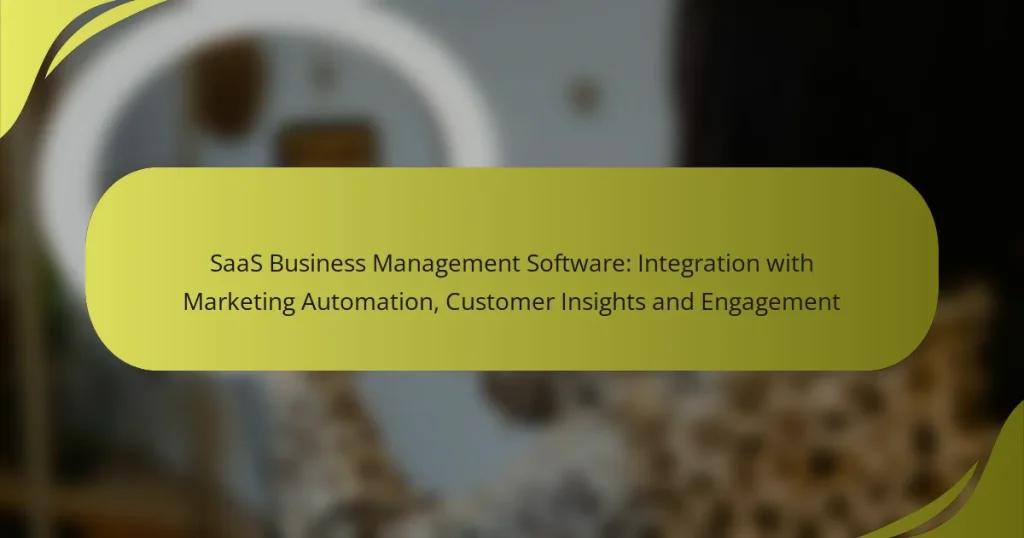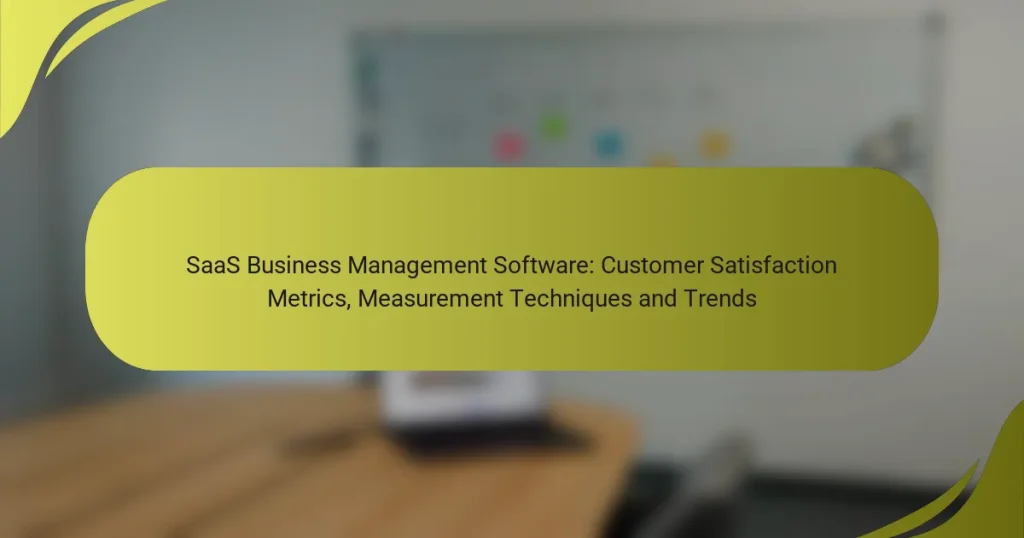SaaS business management software for customer relationship management (CRM) is essential for enhancing customer interactions and streamlining operations. Leading platforms like Salesforce, HubSpot, and Zoho offer unique features tailored to various business needs, enabling companies to centralize data and gain valuable insights into customer behavior. By prioritizing integration, usability, and customization, businesses can improve customer satisfaction and foster loyalty.
SaaS Business Management Software: Implementation Strategies, Nonprofit Needs and Success Factors
SaaS Business Management Software: AI Integration, Feature Enhancement and User Experience
SaaS CRM Solutions: B2B, B2C and Key Differences
SaaS Business Management Software: Selection Criteria, Features and Benefits
SaaS Business Management Software: Integration with Marketing Automation, Customer Insights and Engagement
SaaS Business Management Software: Customer Satisfaction Metrics, Measurement Techniques and Trends
What are the best SaaS CRM solutions for businesses?
The best SaaS CRM solutions for businesses include Salesforce, HubSpot, Zoho, Pipedrive, and Freshsales. Each of these platforms offers unique features and pricing structures, making them suitable for various business needs and sizes.
Salesforce CRM
Salesforce CRM is a leading solution known for its extensive customization options and robust features. It caters to businesses of all sizes, providing tools for sales, marketing, and customer service.
Consider the complexity of your needs when choosing Salesforce, as its vast array of features can be overwhelming for smaller businesses. Pricing typically starts in the low hundreds of USD per user per month, depending on the plan selected.
HubSpot CRM
HubSpot CRM is popular for its user-friendly interface and free tier, making it ideal for startups and small businesses. It integrates seamlessly with HubSpot’s marketing and sales tools, allowing for a comprehensive approach to customer relationship management.
While the free version offers essential features, upgrading to paid plans provides advanced functionalities such as automation and reporting. Pricing for these plans can range from around 50 to several hundred USD per month, depending on the features needed.
Zoho CRM
Zoho CRM is a cost-effective solution that offers a wide range of features suitable for small to medium-sized businesses. It includes tools for sales automation, analytics, and customer support.
With pricing starting at around 12 USD per user per month, Zoho CRM is an attractive option for budget-conscious businesses. However, be aware that some advanced features may require higher-tier plans.
Pipedrive
Pipedrive is designed with a focus on sales pipeline management, making it ideal for sales teams. Its visual interface helps users track deals and manage customer interactions effectively.
Pricing starts at approximately 15 USD per user per month, which is reasonable for the features offered. However, businesses should evaluate whether its sales-centric approach aligns with their broader CRM needs.
Freshsales
Freshsales, part of the Freshworks suite, provides a comprehensive CRM solution with strong automation and AI capabilities. It is suitable for businesses looking to enhance their sales processes.
With plans starting around 15 USD per user per month, Freshsales offers competitive pricing for its features. Businesses should consider its integration capabilities with other Freshworks products for a more cohesive experience.
How does SaaS CRM improve customer relationships?
SaaS CRM enhances customer relationships by providing tools that streamline communication, centralize data, and offer insights into customer behavior. This software allows businesses to manage interactions more effectively, leading to improved customer satisfaction and loyalty.
Centralized customer data
Centralized customer data enables businesses to store all relevant information in one accessible location. This includes contact details, purchase history, and interaction logs, which can be easily retrieved by any team member. By having a comprehensive view of each customer, businesses can tailor their services and communications to meet individual needs.
For example, a sales representative can quickly access a customer’s previous interactions and preferences, allowing for more personalized service. This reduces the chances of miscommunication and ensures that customers feel valued and understood.
Automated communication
Automated communication tools within SaaS CRM systems help businesses maintain consistent contact with customers. Features such as email marketing automation and scheduled follow-ups ensure that customers receive timely information without manual effort. This can significantly enhance customer engagement and retention.
For instance, businesses can set up automated reminders for upcoming appointments or send personalized offers based on customer behavior. This proactive approach keeps customers informed and engaged, reducing the likelihood of them feeling neglected.
Enhanced customer insights
Enhanced customer insights are crucial for understanding customer preferences and behaviors. SaaS CRM systems often include analytics tools that track customer interactions and feedback, providing valuable data for decision-making. Businesses can identify trends and patterns that inform marketing strategies and product development.
By analyzing customer data, companies can segment their audience and target specific groups with tailored campaigns. This targeted approach can lead to higher conversion rates and improved customer satisfaction, as customers receive relevant offers that resonate with their needs.
What features should you look for in a SaaS CRM?
When selecting a SaaS CRM, prioritize features that enhance customer engagement and streamline operations. Key aspects include integration capabilities, user-friendly interfaces, customization options, and robust reporting and analytics.
Integration capabilities
Integration capabilities are crucial for a SaaS CRM, as they allow seamless connectivity with other business tools such as email, marketing platforms, and accounting software. Look for systems that support popular integrations like Salesforce, HubSpot, or Mailchimp to ensure smooth data flow.
Consider whether the CRM offers APIs or pre-built connectors, which can significantly reduce setup time and enhance functionality. A well-integrated CRM can provide a unified view of customer interactions across various channels.
User-friendly interface
A user-friendly interface is essential for ensuring that your team can quickly adopt and effectively use the CRM. Look for intuitive navigation, clear layouts, and easy access to key features without extensive training.
Consider testing the software through free trials to gauge usability. A CRM that is easy to navigate can lead to higher user satisfaction and better data entry accuracy, ultimately improving customer relationships.
Customization options
Customization options allow you to tailor the CRM to fit your specific business needs. Look for features that enable you to modify fields, layouts, and workflows to align with your unique processes.
Assess whether the CRM supports custom reporting and dashboards, which can help you track metrics that matter most to your business. A flexible CRM can adapt as your business grows and changes.
Reporting and analytics
Robust reporting and analytics features are vital for understanding customer behavior and measuring the effectiveness of your sales strategies. Choose a CRM that offers customizable reports and real-time data analysis to help you make informed decisions.
Look for tools that provide insights into sales trends, customer interactions, and campaign performance. Effective reporting can help identify areas for improvement and drive strategic initiatives to enhance customer relationships.
What are the pricing models for SaaS CRM software?
SaaS CRM software typically employs several pricing models that cater to different business needs and budgets. Understanding these models helps businesses choose the most suitable option for managing customer relationships effectively.
Subscription-based pricing
Subscription-based pricing is the most common model for SaaS CRM solutions. Businesses pay a recurring fee, usually monthly or annually, which grants them access to the software and its features. This model allows for predictable budgeting and often includes updates and customer support.
Prices can vary significantly based on the features offered, ranging from around $10 to several hundred dollars per user per month. Companies should consider their specific needs and the potential for scaling when selecting a subscription plan.
Freemium models
Freemium models provide basic CRM features at no cost, allowing users to test the software before committing to a paid plan. This model can be beneficial for small businesses or startups with limited budgets, as it enables them to manage customer relationships without upfront investment.
However, freemium versions often come with limitations, such as restricted features or user caps. Businesses should evaluate whether the free version meets their needs or if upgrading to a paid plan is necessary for growth.
Tiered pricing plans
Tiered pricing plans offer multiple packages at different price points, each with varying features and capabilities. This approach allows businesses to choose a plan that aligns with their size and requirements, making it easier to scale as the organization grows.
For instance, a basic tier may start at $15 per user per month, while advanced tiers could reach $100 or more, depending on additional features like advanced analytics or integrations. Companies should assess their current and future needs to select the most appropriate tier.
How to choose the right SaaS CRM for your business?
Choosing the right SaaS CRM for your business involves understanding your specific needs and evaluating various options based on features, support, and pricing. A well-selected CRM can enhance customer relationships and streamline operations, making it crucial to assess your requirements carefully.
Assess business needs
Start by identifying the unique requirements of your business. Consider factors such as the size of your team, the complexity of your sales processes, and the specific functionalities you need, like lead tracking or reporting capabilities. This assessment will help you narrow down your options effectively.
Engage with your team to gather insights on what they find essential in a CRM. For instance, if your sales team frequently travels, mobile access might be a priority. Documenting these needs can guide your selection process and ensure that the chosen CRM aligns with your operational goals.
Compare features
Once you have a clear understanding of your needs, compare the features of different SaaS CRM solutions. Look for essential functionalities such as contact management, automation tools, and integration capabilities with other software you use. A feature comparison table can be beneficial for visualizing differences.
Pay attention to scalability as well; ensure the CRM can grow with your business. For example, if you anticipate expanding your sales team, choose a CRM that offers tiered pricing or additional user licenses without significant cost increases.
Evaluate customer support
Customer support is a critical aspect of any SaaS CRM. Investigate the support options available, including live chat, email, and phone support. A responsive support team can significantly reduce downtime and improve user experience, especially during the onboarding process.
Consider reading reviews or testimonials to gauge the quality of customer support from different providers. Look for insights on response times and the effectiveness of the support team in resolving issues. A CRM with strong customer support can save your business time and frustration in the long run.
What are the integration options for SaaS CRM?
SaaS CRM systems offer various integration options to connect with other applications and services, enhancing functionality and data flow. Common integration methods include APIs, third-party connectors, and native integrations with popular platforms.
API Integrations
API integrations allow SaaS CRM systems to communicate with other software applications directly. This method enables real-time data exchange, which is crucial for maintaining up-to-date customer information across platforms. Many CRMs provide RESTful APIs, making it easier for developers to build custom integrations.
When considering API integrations, assess the documentation and support provided by the CRM vendor. A well-documented API can significantly reduce development time and potential errors. Additionally, ensure that the API can handle the expected data volume and frequency of requests.
Third-Party Connectors
Third-party connectors serve as intermediaries that facilitate integration between different software systems without requiring extensive coding. Tools like Zapier or Integromat allow users to create workflows that automate tasks between their CRM and other applications, such as email marketing platforms or project management tools.
Using third-party connectors can save time and resources, especially for small businesses without dedicated IT teams. However, it’s essential to evaluate the reliability and security of these connectors, as they will handle sensitive customer data.
Native Integrations
Many SaaS CRM solutions offer native integrations with popular applications like Google Workspace, Microsoft 365, or accounting software. These built-in connections typically provide seamless data synchronization and user-friendly setup processes.
Native integrations are often the easiest to implement and maintain, as they are designed to work directly with the CRM. However, businesses should verify that the native integrations meet their specific needs and check for any associated costs or limitations.

